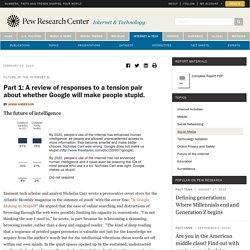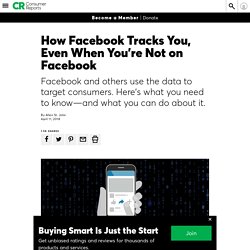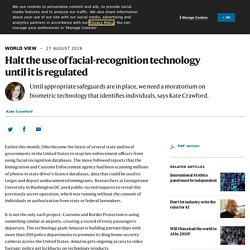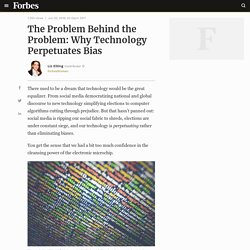

Logging into the proxy (Rutgers University Libraries) Logging into the proxy (Rutgers University Libraries) (Chelsea Rizzolo) JP Rangaswami: Information is food. "Big Other: Surveillance Capitalism and the Prospects of an Information Civilization" (Zuboff, 2015) CARLEY DAURIA Part 1: A review of responses to a tension pair about whether Google will make people stupid. The future of intelligence Eminent tech scholar and analyst Nicholas Carr wrote a provocative cover story for the Atlantic Monthly magazine in the summer of 2008 with the cover line: “Is Google Making us Stupid?”

He argued that the ease of online searching and distractions of browsing through the web were possibly limiting his capacity to concentrate. “I’m not thinking the way I used to,” he wrote, in part because he is becoming a skimming, browsing reader, rather than a deep and engaged reader. How Facebook Tracks You, Even When Not on Facebook. As you travel through the web, you’re likely to encounter Facebook Like or Share buttons, which the company calls Social Plugins, on all sorts of pages, from news outlets to shopping sites.
While this article focuses on the typical, non-searching Facebook user, I will argue in my discussion that this has broad implications for the future of searching. -- Victoria Allums – vallums
Click on a Like button and you can see the number on the page’s counter increase by one; click on a Share button and a box opens up to let you post a link to your Facebook account.

Kaitlyn Ilinitch - "Sci-Hub, a Challenge for Academic and Research Libraries" Stefanie Freund "Technology Addiction" from CQ researcher. (Meredith Magenheim) Bias in the Algorithm. Algorithms are more than equations.

They redefine us. A few years back, rumor had it that a multinational technology company was making great strides to finalize and implement a computerized hiring tool. Using artificial intelligence (AI), the program scored job applicants on a scale of 1 to 5 and predicted which of the top candidates would be best for the job. About a year into the tool's development, progress halted when programmers discovered the software was blatantly discriminating against women. Applicants were penalized for graduating from all-women's colleges or even simply using the word "women's" on their résumé.
(Meredith Magenheim) Robin Hauser: Can we protect AI from our biases? Nikki W. Homelessness and the Ethics of Information Access Logging into the proxy (Rutgers University Libraries) (Jennifer) Before Clearview Became a Police Tool, It Was a Secret Plaything of the Rich. One Tuesday night in October 2018, John Catsimatidis, the billionaire owner of the Gristedes grocery store chain, was having dinner at Cipriani, an upscale Italian restaurant in Manhattan’s SoHo neighborhood, when his daughter, Andrea, walked in.

She was on a date with a man Mr. Catsimatidis didn’t recognize. After the couple sat down at another table, Mr. Catsimatidis asked a waiter to go over and take a photo. Mr. “I wanted to make sure he wasn’t a charlatan,” said Mr. Ms. Clearview was unknown to the general public until this January, when The New York Times reported that the secretive start-up had developed a breakthrough facial recognition system that was in use by hundreds of law enforcement agencies. In response to the criticism, Clearview published a “code of conduct,” emphasizing in a blog post that its technology was “available only for law enforcement agencies and select security professionals to use as an investigative tool.” Mr.
Diana Ovalles- Halt the use of facial-recognition technology until it is regulated. Earlier this month, Ohio became the latest of several state and local governments in the United States to stop law-enforcement officers from using facial-recognition databases.

The move followed reports that the Immigration and Customs Enforcement agency had been scanning millions of photos in state driver’s licence databases, data that could be used to target and deport undocumented immigrants. Researchers at Georgetown University in Washington DC used public-record requests to reveal this previously secret operation, which was running without the consent of individuals or authorization from state or federal lawmakers.
It is not the only such project. Customs and Border Protection is using something similar at airports, creating a record of every passenger’s departure. The technology giant Amazon is building partnerships with more than 200 police departments to promote its Ring home-security cameras across the United States. The Problem Behind the Problem: Why Technology Perpetuates Bias (Cassondra McCarthy) There used to be a dream that technology would be the great equalizer.

From social media democratizing national and global discourse to new technology simplifying elections to computer algorithms cutting through prejudice. But that hasn’t panned out: social media is ripping our social fabric to shreds, elections are under constant siege, and our technology is perpetuating rather than eliminating biases. You get the sense that we had a bit too much confidence in the cleansing power of the electronic microchip. Human-built machines immortalize human problems, as we are discovering more and more.
Voice recognition software isn’t good at identifying higher-pitched (i.e., predominantly women’s) voices.